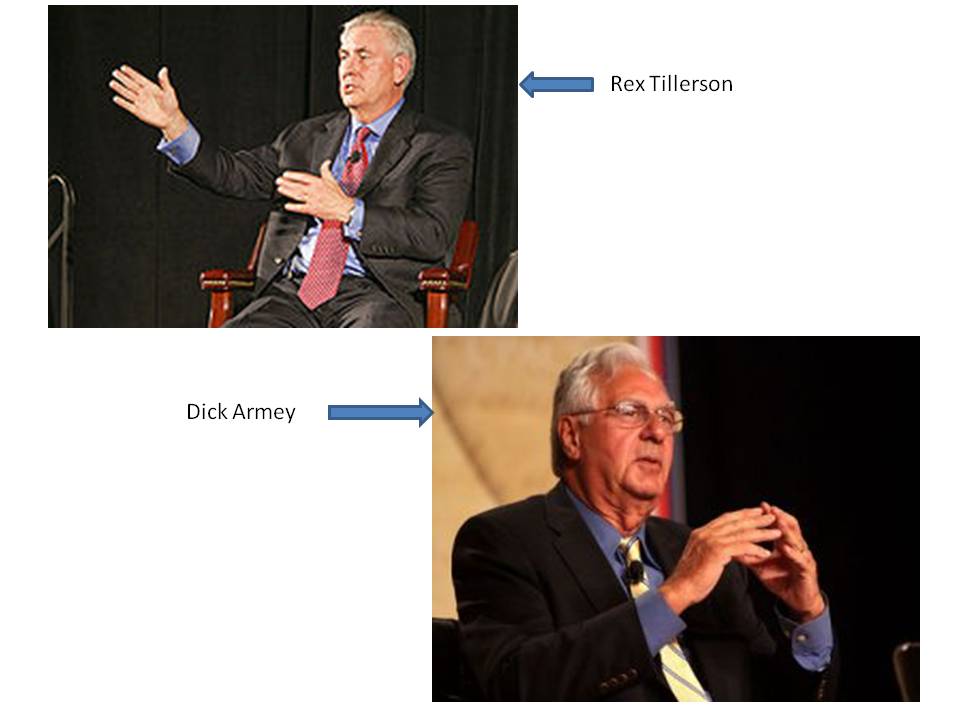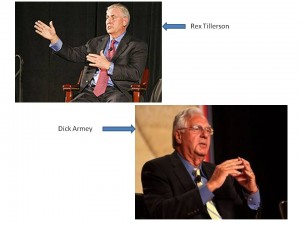Why do we feel no sympathy for Exxon CEO Rex Tillerson, not to speak of former Tea Party leader, Dick Armey. Both are suing Bartonville Water Supply Corporation to stop the building of a 160 foot water tower “monstrosity” adjacent to Tillerson’s $5 million Bar RR Ranch and Armey’s $2 million property, both near Dallas? The complaint is that the water tower will diminish property values and cause “unreasonable discomfort and annoyance to persons of ordinary sensibilities.”
Many of us know that Exxon Mobil has been earning record profits – $45.22 billion in 2008, for example – while remunerating Rex Tillerson with over $40 million in 2012, much of it based on fracking for natural gas, a process that forced whole communities out of their homes. Dick Armey has dedicated much of his life to unbridled corporate exploitation of land, environment and people – as Republican House Majority Leader and as Tea Party darling.
Added to the unsightly 160 foot water tower is the real concern that Bartonville Water Supply Corporation will sell some of the stored water to energy companies for hydraulic fracturing (fracking), prompting trips that would route huge trucks back and forth to the tower, creating “noise nuisance and traffic hazards.”
In drought-stricken Texas, in the area of Dallas, fracking companies use about 9% of the water supply, along with sand and chemical blends to fracture rock formations in stimulating the release of hydrocarbons – gas and oil. Often it’s a day and night operation. Texas experienced its worst single-year drought ever in 2011 and is expected to face even worst water-stress in the future.
The pity for average people who suffer the scourge of fracking, like the whole community of Dish, TX with its wells poisoned by fracking, is that they don’t have the resources to sue or to move away from the blight. Contrast that with Rex Tillerson who can hire the best lawyer with his earnings of over $40 million a year and take a property loss considering his Exxon shares are worth over $130 million. Dick Armey is not hurting either after his severance agreement from Freedom Works, a Tea Party organization supported by the Koch brothers.
As for Exxon Mobil, fracking has helped the multinational corporation become one of the largest producers of natural gas in the world, and Tillerson has argued publicly that fracking is safe and that regulations on the industry unnecessarily hinder his company’s operations. Contrary evidence was provided when pollutants like chlorides, barium and strontium leaked from an Exxon subsidiary facility into a tributary of the Susquehanna River basin in Pennsylvania in 2010, poisoning drinking water.
That money provides separate justice is not an epiphany in contemporary America, a fact that would lead us to expect a more favorable outcome for the Tillerson and Armey suits. Perhaps a corollary issue is the seemingly power-determined rather than performance-driven bounty for CEOs of the largest companies. Time and again CEOs gain outlandish pay — and remember the bonuses after the crash, regardless of performance, something average workers do not experience. Are CEOs worth 400 times more than the average worker?
Investopedia says, “The highest ranking executive in a company whose main responsibilities include developing and implementing high-level strategies, making major decisions and managing overall operations and resources.”
For every element of that description, Exxon’s CEO has a gaggle of presidents reporting to him about how they’re managing batteries of VPs, groups of managers and masses of employees. Exxon’s CEO manages that handful of presidents who bring him performance updates. Big business CEOs spend very little time managing and most of their time working on strategy and future direction, usually aided by corporate-friendly government leaders.
A CEO is supposedly responsible to the board of directors, but it’s usually the other way around. Too often, the board chairman position is largely ceremonial. A board simply rubber stamps management decisions. As a result of management’s control of the proxy voting system, it is more likely for management to select board directors than vice versa. Accordingly, the role of directors is largely advisory and does not involve significant decision making. It was a well-known fact, for example, that former Disney CEO, Michael Eisner chose friends as board members. Routinely power determines management, not performance.
A related criticism is that the board’s discussions are dominated by the CEO, who typically also serves as chairman of the board. When the same person controls the agenda of boardroom proceedings as well as the day-to-day performance of the company, the power of the individual director is diminished. Many directors act as partners of senior management, rather than as monitors able and willing to reward and penalize management’s performance.
Accordingly, Tillerson’s position , and Armey’s influence, will most likely buy special notice from court and government officials regarding the effectiveness of their suits. In contrast, the paucity of leverage exercised by average citizens renders them impotent when dealing with monolithic corporations like Exxon Mobil, which have power and politics behind them.
—————————————————————-
Follow more from this author:
Facebook @ ——> Common Good
Facebook @ —–> Promote the General Welfare
Facebook@ —–> Our Ties With the Cosmos





